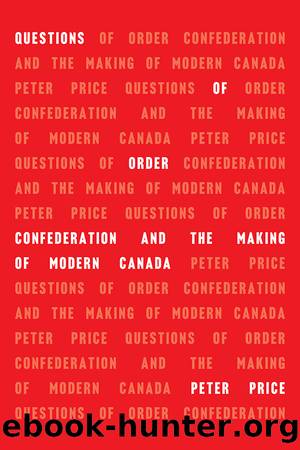Questions of Order by Peter Price

Author:Peter Price
Language: eng
Format: epub
Tags: Canada – History – Confederation, 1867., Political participation – Canada – History.
Publisher: University of Toronto Press
Parliamentary Loyalty Resolutions
The extent of discussions of loyalty in the broader Canadian press prompted political responses in the form of parliamentary resolutions that sought to clarify the nature of Canadaâs loyalty. Against the backdrop of multiplying notions of âtrueâ loyalty, these loyalty resolutions were motivated by the perceived need for Canadian politicians to reaffirm their loyalty to Britain. These resolutions indicated that, although political loyalty to the Canadian state had been articulated and defended by various writers in Canadian magazines, politicians in Ottawa maintained the importance of public declarations of Canadian loyalty to Britain and the empire. The loyalty resolutions, reported in Canadian magazines and newspapers, illustrate the extent to which âloyaltyâ had become a highly politicized term by the 1890s, enforcing a certain commitment to imperialism that invited little disagreement or deviation. Unlike the debate between LeSueur and Todd about the meaning of loyalty that had appeared a decade earlier, this political debate sought to minimize differences in the presentation of loyalty in Canada. Importantly, these resolutions reveal that, even while many began to express an idea of loyalty as a modern liberal democratic relationship between citizen and state, the place of the British Crown as a vital cultural symbol endured.
The first resolution was presented by William Mulock, Liberal MP for York North, Ontario, in January 1890. The resolution, addressed to Queen Victoria, communicated the House of Commonsâ desire to ârenew the expression of our unswerving loyalty and devotion to Your Majestyâs person and Governmentâ and to assure that public statements that questioned such loyalty were âwholly incorrect representations of the sentiments and aspirations of the people of Canada.â75 Mulock informed the House that he was prompted to introduce the resolution because of injurious reports supposedly circulating in the American press, which described the breaking down of Canadian political institutions as a result of âracialâ and political dissent. Though he provided no specific references, he was certain that this apparent misinformation would damage Canadian ties with Britain and dissuade prospective immigrants. As both Macdonald and Laurier noted in responding to the motion, there was no special occasion or pressing reason for the motion, but, nevertheless, they agreed that such an expression of loyalty was suitable.
Refuting any idea that French Canadians were not fully loyal subjects, Guillaume Amyot, MP for Bellechasse, Quebec, assured the House that he and his fellow French-speaking Canadians had a proud history of loyalty to Britain, which he traced back to the Quebec Act, 1774.76 Amyot, a Nationalist Conservative MP who had commanded a battalion of militia rifles in the North West uprising of 1885, was no doubt aware of allegations that had appeared periodically since Confederation that French Canadians were not truly loyal subjects. This rhetoric became particularly pronounced at moments of conflict such as the North West uprisings and the trial of Louis Riel. At the height of the Riel trial, for example, one writer in the Week insisted that French Canadians could never be loyal because of their allegiance to Rome, allegations often repeated by Goldwin Smith.
Download
This site does not store any files on its server. We only index and link to content provided by other sites. Please contact the content providers to delete copyright contents if any and email us, we'll remove relevant links or contents immediately.
Storytelling for dummies by Andrea Fontana(1519)
Effortless by Greg McKeown(1490)
The Practice by Seth Godin(1444)
Mastering Blockchain by Lorne Lantz(1430)
Blockchain Quick Reference by Paul Valencourt & Samanyu Chopra & Brenn Hill(1182)
Business Information Systems Workshops by Unknown(979)
The wind in the willows by Kenneth Grahame(954)
Mastering Blockchain by Lorne Lantz & Daniel Cawrey(932)
How to Lead by David M. Rubenstein(860)
The Ape in the Corner Office by Richard Conniff(821)
Handbook of Big Data Analytics by Unknown(751)
Social Media Engagement For Dummies by Aliza Sherman(737)
Getting Started with Data: The first book you should read to successfully get along with data. by Menegatti Gabriel & Team Simbiose Ventures(733)
FunRetrospectives: activities and ideas for making agile retrospectives more engaging by Paulo Caroli & Tainã Caetano Coimbra(724)
Taking Care of Yourself (HBR Working Parents Series) by Harvard Business Review(723)
Evernote for Self Publishing: How to Write Your Book in Evernote from Start to Finish by Jose John(703)
Business Storytelling For Dummies by Unknown(699)
Help! My Facebook Ads Suck-- by M. D. Cooper & Jill Cooper(685)
A Leader Listens by Ajay Banga(672)
